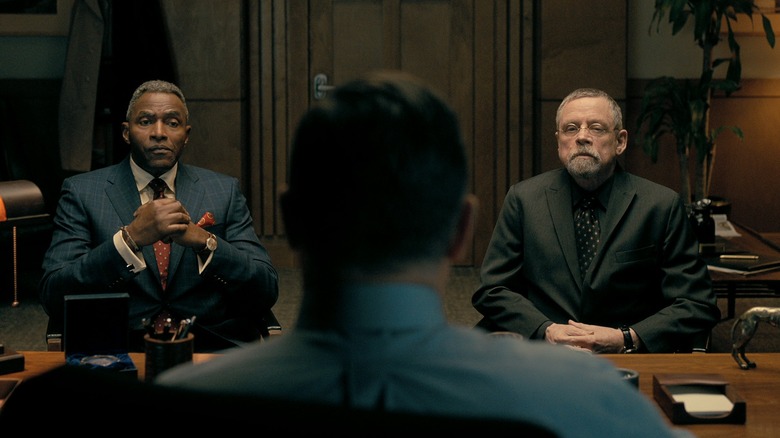The Fall Of The House Of Usher: What Is Ultima Thule & Why Is It So Controversial?
Contains spoilers for "The Fall of the House of Usher," Episode 6 — "Goldbug"
Arthur Pym (Mark Hamill) is a man of action ... horrible, dangerous action. Look, a lawyer doesn't earn a nickname like "the Pym Reaper" by keeping his hands clean. According to Roderick Usher (Bruce Greenwood), Arthur's always been the kind of person who seeks dark adventure. In Episode 6, Roderick tells Auguste Dupin (Carl Lumbly) that Arthur claims to have found Ultima Thule during his earlier globe-trotting years. Auguste believes that Roderick, or at least Arthur, is lying, but the Usher's legal defense rarely resorts to such easily disprovable theatrics. He's brutally succinct and lethally efficient.
And yet, the truth behind his claim isn't why we're here. We're here because no small percentage of the world associates Ultima Thule with the Nazi party and adjacent alt-right organizations. Much like the swastika, the legend of Ultima Thule predates the Nazi party because Adolf Hitler loved intellectual property theft. The legend, which broadly describes a hidden exotic land tucked away in the far north, was appropriated by the Nazis, who wanted the name for their own Aryan paradise. Under Hitler's genocidal vision, Ultima Thule became a white supremacist's fantasy land.
Again, Ultima Thule is older than the Nazi's special brand of hatred. Still, it's not unreasonable to assume that Netflix intentionally used terminology associated with unsavory individuals when writing "The Fall of the House of Usher." Remember, Arthur's not exactly a boy scout. He's got a body count, as in the dead people kind.
Ultima Thule exists outside of the Nazi party ... but only just
According to Merriam-Webster, "In Latin, ultima is the feminine form of the adjective ultimus ['farthest or last']." Thule is an island that the ancient Greeks and Romans believed to be the most northerly point. Combined together, Ultima Thule is just a catch-all term used to describe the farthest northern land. In a very literal sense, Santa Claus calls Ultima Thule "home." Outside of Nazi co-optation, the phrase still lives on in cultures across the world as a nigh-unachievable, quasi-magical land.
In Square Enix's "Final Fantasy" videogame franchise, specifically in "Final Fantasy XIV: Endwalker," the name Ultima Thule refers to the literal edge of creation. Poets and novelists like Henry Wadsworth Longfellow and Henry Handel Richardson wrote about Ultima Thule prior to World War II.
But, much like the swastika, Ultima Thule now carries the heavy burden of being connected to one of history's most notable villains. That's why NASA ran into some controversy back in 2019 when scientists nicknamed an object in space — which would later officially bear the name Arrokoth — Ultima Thule. It's just not a phrase that can be bandied around in the current political climate without providing additional clarifying statements.
"The Fall of the House of Usher," Mike Flanagan's best series yet, is written so that many of its characters acknowledge the social state of public branding in 2023, which is why we're fairly confident that Netflix intentionally used the phrase in relation to the Pym Reaper. Who better to associate with a dated monster than actual factual Nazis?

